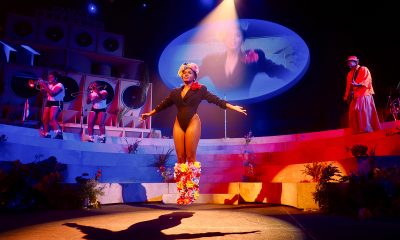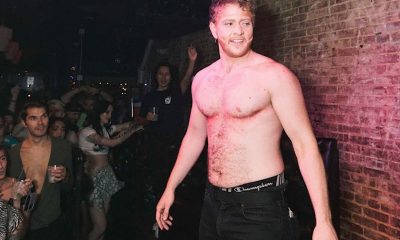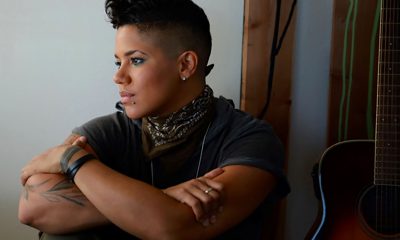Arts & Entertainment
Queen of everything
Boy George chats up his new album, tour and how he got his mojo back
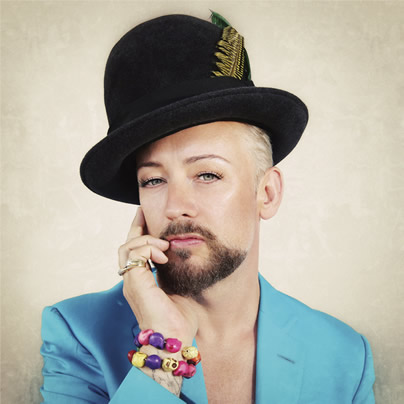
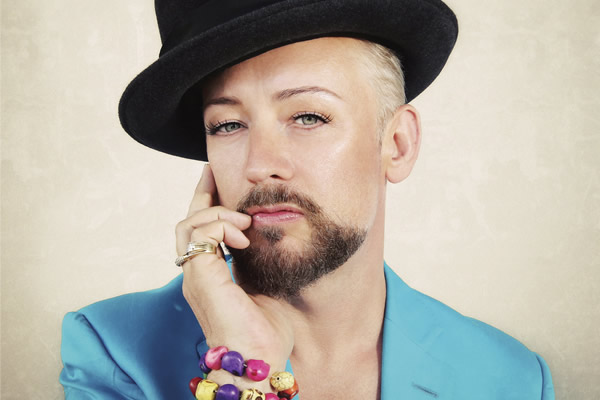
Boy George says in some ways straight acts can experiment with gender more than gay artists. (Photo courtesy High Rise PR)
Boy George
Monday, April 21
9:30 Club
815 V St. N.W.
930.com
$35
Doors open at 7 p.m.
Boy George is the first to acknowledge a cliché.
Getting sober in 2008 and turning 50 two years ago are big “take stock” moments for many and no less so for him.
“It was a huge turning point for me,” he says of his milestone birthday. “I thought, ‘I’ve got to get my shit together, I’ve got to focus, this is important.’ I just felt I’d wasted a lot of time. I looked at myself and thought, ‘God, I’ve done nothing.’ I know I’ve done a lot, I’ve always worked. I’ve grafted and always made money, but a lot of it was pointless because no one knew what I was doing.”
This year, the world is seeing the fruit of those epiphanies. His new album “This Is What I Do” was out in the UK last fall and officially drops in the U.S. with three bonus cuts on March 25. The last several years have seen him release a spate of side projects of various scope, but this is his first full-fledged solo album since 1995’s “Cheapness and Beauty.” He starts a U.S. leg of his tour on April 18 in Philadelphia and plays D.C.’s 9:30 Club on April 21.
During a Saturday afternoon phone chat from his London home last weekend, George — in his ever-delightful, clipped British accent — was chatty, self deprecating, quick to laugh and balked or sidestepped no questions. His comments have been slightly edited for length.
WASHINGTON BLADE: I know you’ve been DJing a lot and working on various things, but how did it work out that you released a new album at this time? Why now?
BOY GEORGE: Well, you know, as you said, I’ve been DJing very happily for the last 25 years and I haven’t really had a record deal for a long time. I suppose I have thought about making records but, you know, I wasn’t sure how I was going to do it. You know, whether I was going to sign with a major label or do something more independent. I also changed management a couple of years ago and wanted to kind of start fresh with a bunch of people that perhaps could kind of see beyond what I was. I think when you’ve had a very, very successful career like I had in the ‘80s, people tend to kind of hope you’re going to try and repeat that. They’re always waiting for you to write the next “Karma Chameleon,” but it’s never going to happen (laughs). Everything I’ve ever done has been kind of instinctual and impulsive and spontaneous and I’ve never really been the kind of artist that can kind of just pull it out of a hat. I have to feel it. … I just felt it was the right time. We discussed the different ways I could go about making a record and I decided to be brave and pay for it myself and own it myself which is a new thing for me, kind of a grown up move. And so far, you know, it’s been the right choice.
BLADE: When was it recorded and how long did it take?
GEORGE: We started about March last year and we did it within about four months. Not solidly. We recorded and then somebody else mixed it. I would say about four to five months last year.
BLADE: How was the reception in the UK last fall?
GEORGE: We’ve had amazing reviews. Comeback of the year, Boy George has finally got his mojo back, you know, blah, blah, blah. Lots of compliments. I mean, much to my surprise really, because I wasn’t really sure what kind of reaction I would get. I wasn’t sure what to expect. So yeah, everything in the UK has been kind of another surprise. England tends to get much more excited about Beyonce than anything that comes from here. It’s like all America, America, hip-hop, Beyonce, Lady Gaga. Nobody cares about Boy George anymore (laughs). That’s why I’m relying on you guys in America.
BLADE: The first single “King of Everything” says “What is the word on the street? Have I lost my crown?” Have you?
GEORGE: Well, the song isn’t just about me, it’s about everyone. It’s about human frailty, people messing up, which is a very human thing, yet it is also about me but it’s about you, it’s about everyone. It’s not literal. The crown is a metaphor. If it was about me, I’d call it “Queen of Everything.”
BLADE: How did the UK tour go last fall?
GEORGE: It was amazing. Very small, very affectionate and the audiences were adorable. They were mostly the kind of hardcore fans, so they were really affectionate.
BLADE: About how long do you usually play?
GEORGE: It depends on the curfew. We do about an hour and a half, maybe two hours. Not quite Bruce Springsteen-length. But we play for as long as we can. When you’re doing a show, sometimes if the mood is right, you can keep it going, depending on the audience reaction, really. But obviously some venues have a curfew so you can’t play longer than a certain time.
BLADE: About how much of the new album do you work into the set list?
GEORGE: We kind of try and balance it with things people know, some things people haven’t heard, some new stuff, some old stuff. You know, I’ve been doing this a while and one thing I’ve continued to do is to play live. At the end, you have to figure out a way to reach the audience.
BLADE: How does the new stuff sit with the Culture Club hits? Is it hard to build a set list that flows?
GEORGE: No, I don’t think it’s difficult. With the things people know, you’re always in a very safe area. If you sing a song that’s been a hit, that’s very safe so no, I wouldn’t say it’s difficult. There are certain songs that I don’t do. Obviously with that kind of a back catalogue, there are some songs you grow into and some that you say, “OK, this doesn’t really speak to who I am anymore.” So you kind of try to mix it up and keep it interesting, not just for the audience but also for yourself. You don’t want it to be a kind of robotic show that’s the same every night. Myself and John, who plays guitar in my band, we have sections where we do acoustic stuff and we can do all sorts of things there and change things around and do new things. That helps keep the show exciting.
BLADE: Do you still have the goatee?
GEORGE: I do.
BLADE: Your look at present seems more kind of genderfuck than androgynous. Just a whim or do you feel more comfortable with mixing in masculine elements than you have in previous years?
GEORGE: I just had some time off and didn’t shave for a few days and kind of looked at myself and thought, “Oh, I quite like this look.” It’s not something I really sat down and thought about. I just kind of grew my beard when I was on break and other people seemed to like it and other people didn’t like it, which made me want to keep it more. I might get bored with it at some point but I’m loving it at the moment.
BLADE: Lots of pop stars have played around with androgynous looks — I’m thinking of David Bowie and Prince — and the public seems to accept them as straight. You were always pretty much out for the most part. Do you feel the public overall has pretty good gaydar?
GEORGE: I don’t know really. I think there are some audiences that don’t really want to know, depending on the artist. Sometimes people have this kind of spare-me-the-details kind of attitude. I think it’s more about what kind of artist you are and in what ways you want to affect the audience. That’s the starting point for me. It’s about what’s going to make you happy, do you know what I mean? How much of yourself you reveal. I think it’s much easier for somebody straight to play around with these boundaries because they’re not being defined by their sexuality. If you’re gay, then you’re gay and you have to strike a sort of balance so people don’t feel you’re flaunting it in their face or preaching, you know. I think as a gay artist, you have to walk a much finer line than, say, somebody who’s just having a flirtation with this. I mean, it’s much easier for someone straight like Macklemore to sing a song with the word gay in it. A few years ago I made an album called “Cheapness and Beauty” and there was a song called “Same Thing in Reverse” and I was told categorically this will never, ever get played on the radio because I used the phrase “kamikaze queer” in it. You can get away with more when you’re straight.
BLADE: You’ve talked about making a new album with Culture Club this year. Is that still in the cards?
GEORGE: Yes, we are looking at the possibility of recording some stuff this year but at the moment, we’re kind of still in the writing stages. We’ve had some great sessions and we really did enjoy ourselves and it was a really nice experience. Everybody came away feeling really good about it and, you know, we’re going to see what we can do next.
BLADE: It’s so great to see you looking so good, sounding so good and apparently really thriving. A few of your contemporaries who were also huge in the ‘80s haven’t fared as well. What did you think and feel when you heard Michael Jackson and Whitney Houston had died?
GEORGE: Oh my God, you know, I mean Michael Jackson. And I loved Whitney Houston like so much. I was just a massive, massive fan. I loved her voice. And Michael Jackson, you know, I was at home when it happened and I just remember thinking, “Oh my God, this is so sad.” You know, he was such an incredible artist. For the last few years of his life, I felt like there was so much pressure on him and he looked world-weary every time I saw him. I felt such sadness for him. I was just so sad when he died and Whitney, what a shame for both of them. They were great, great artists. I was a huge Michael Jackson fan and a huge Whitney Houston fan and I’m not ashamed to say I did cry. I thought it was really sad.
BLADE: Conversely does it make you happy when you see some of those artists still doing well today. Like Cyndi Lauper, for instance, just won a Tony.
GEORGE: I’m always happy when anyone does well. That’s a measure of maturity, I think. Cyndi’s a friend. I haven’t seen her for a while, but she’s a great girl and, you know, yeah, I think when you see your contemporaries doing well, it gives you hope. You think, “OK, anything’s possible.”
BLADE: You recognized early on that fame was fickle and I remember you telling Johnny Carson you knew staying at that level at the height of Culture Club was not sustainable and that you envisioned yourself eventually writing songs for other artists and doing other things. How has that played out differently than you thought it might have when you were 22?
GEORGE: Oh, I think when you’re 22 you really think you know it all, don’t you? (laughs) You listen back to the things you say and you think, “Oh my God, you really thought you knew it all.” And I think at that age, you’re still learning so much. I feel very fortunate to still be doing what I love.
BLADE: Yes, but it struck me as rather insightful that you realized even then that pop careers always ebb and flow.
GEORGE: It may be one of the reasons I’ve done other things. I’ve never wanted to just rest on my laurels. I don’t have the idea of trying to kind of repeat something. So in a way, DJing has been an incredible second career for me. When I first started it, my manager at the time thought it was a really bad idea and told me I shouldn’t do it. But again, I just followed my instincts and it was the right thing to do because it allowed me to avoid nostalgia. I’ve been able to be involved in a quite progressive industry and not have to worry about what I used to be or, you know, the ‘80s, and all that stuff. So I’m really happy that I made that decision. I like to work. I’m a worker and I’m always up for a new challenge.
BLADE: Back in the early ‘90s, the theme from “Crying Game” was this huge out-of-nowhere smash radio hit in the U.S. Do you still sing it live?
GEORGE: From time to time. Actually, maybe that’s a good one to put into the set in America. I’ll write that down.
BLADE: Is it harder to break a song in the U.S. now than it was years ago? Not even with yourself, necessarily, but just in general?
GEORGE: I don’t know what it’s like now because I’m not involved in that kind of trying to have hits, you know. I think past a certain age, you’re just kind of marginalized in the world anyway.
BLADE: Does that bring with it artistic freedom?
GEORGE: I think it does. Once you kind of get over the shock and the horror that certain radio stations won’t play your new stuff no matter how good you are, I mean that’s really the bonkers thing. I’m not sure it’s as bad in America as it is here, but certainly here, it’s just ridiculous. But it kind of remains to be seen. It’s a very different landscape now. Making records is very different and the way we promote ourselves is very different. In a way I’m kind of starting again, so I’ll let you know.
BLADE: How many of the players from the album do you tour with?
GEORGE: All of them.
BLADE: The album has such a lush sound — is that easy to duplicate on stage?
GEORGE: Well, we have a nine-piece band that we’re touring with at great expense so we probably won’t be making any money. But I think it’s really important to have a great band and we had a great time in the UK last year. We do England and Europe then we go to America. We’ll be steaming by the time we get to the states.
BLADE: How long have you been a vegan?
GEORGE: I’m not strictly a vegan but I’m very conscious about what I eat and I don’t eat a lot of dairy, though I do eat some cheeses. I’ve been on a very particular metabolic plan diet for two years that’s all about your hormonal reaction to certain foods so some of the stuff I don’t eat is very random — like pumpkin, kale, onion or lemon. It’s very individual and different for each person. It’s been sort of life changing for me but I don’t really call myself anything because then you eat a piece of cheese and everybody freaks out.
BLADE: And you run too?
GEORGE: Well, I exercise.
BLADE: Is the U.S. version of the album the same?
GEORGE: No, it’s got more songs. I wrote a song called “Turn On a Little Light For Me,” which I wrote especially for the American album and which I love. We were asked by the label to provide some more stuff and I had a couple covers — “Video Games” by Lana Del Rey and the Bob Dylan song “Make You Feel My Love,” but I didn’t just want covers as the bonus content so I wrote a new song too. It’s about hope. A lovely kind of little Dylan-esque kind of song.
BLADE: Thanks for your time.
GEORGE: Thank you.
Books
‘Pronoun Trouble’ reminds us that punctuation matters
‘They’ has been a shape-shifter for more than 700 years

‘Pronoun Trouble’
By John McWhorter
c.2025, Avery
$28/240 pages
Punctuation matters.
It’s tempting to skip a period at the end of a sentence Tempting to overuse exclamation points!!! very tempting to MeSs with capital letters. Dont use apostrophes. Ask a question and ignore the proper punctuation commas or question marks because seriously who cares. So guess what? Someone does, punctuation really matters, and as you’ll see in “Pronoun Trouble” by John McWhorter, so do other parts of our language.

Conversation is an odd thing. It’s spontaneous, it ebbs and flows, and it’s often inferred. Take, for instance, if you talk about him. Chances are, everyone in the conversation knows who him is. Or he. That guy there.
That’s the handy part about pronouns. Says McWhorter, pronouns “function as shorthand” for whomever we’re discussing or referring to. They’re “part of our hardwiring,” they’re found in all languages, and they’ve been around for centuries.
And, yes, pronouns are fluid.
For example, there’s the first-person pronoun, I as in me and there we go again. The singular I solely affects what comes afterward. You say “he-she IS,” and “they-you ARE” but I am. From “Black English,” I has also morphed into the perfectly acceptable Ima, shorthand for “I am going to.” Mind blown.
If you love Shakespeare, you may’ve noticed that he uses both thou and you in his plays. The former was once left to commoners and lower classes, while the latter was for people of high status or less formal situations. From you, we get y’all, yeet, ya, you-uns, and yinz. We also get “you guys,” which may have nothing to do with guys.
We and us are warmer in tone because of the inclusion implied. She is often casually used to imply cars, boats, and – warmly or not – gay men, in certain settings. It “lacks personhood,” and to use it in reference to a human is “barbarity.”
And yes, though it can sometimes be confusing to modern speakers, the singular word “they” has been a “shape-shifter” for more than 700 years.
Your high school English teacher would be proud of you, if you pick up “Pronoun Trouble.” Sadly, though, you might need her again to make sense of big parts of this book: What you’ll find here is a delightful romp through language, but it’s also very erudite.
Author John McWhorter invites readers along to conjugate verbs, and doing so will take you back to ancient literature, on a fascinating journey that’s perfect for word nerds and anyone who loves language. You’ll likely find a bit of controversy here or there on various entries, but you’ll also find humor and pop culture, an explanation for why zie never took off, and assurance that the whole flap over strictly-gendered pronouns is nothing but overblown protestation. Readers who have opinions will like that.
Still, if you just want the pronoun you want, a little between-the-lines looking is necessary here, so beware. “Pronoun Trouble” is perfect for linguists, writers, and those who love to play with words but for most readers, it’s a different kind of book, period.
The Blade may receive commissions from qualifying purchases made via this post.

Friday, April 18
“Center Aging Friday Tea Time” will be at 2 p.m. on Zoom. This is a social hour for older LGBTQ+ adults. Guests are encouraged to bring a beverage of choice. For more details, email [email protected].
Go Gay DC will host “LGBTQ+ Community Social in the City” at 7 p.m. at Hotel Zena. This event is ideal for making new friends, professional networking, idea-sharing, and community building. This event is free and more details are available on Eventbrite.
Trans and Genderqueer Game Night will be at 6 p.m. at the DC Center for the LGBT Community. This will be a relaxing, laid-back evening of games and fun. All are welcome and there’ll be card and board games on hand. Feel free to bring your own games to share. For more details, visit the DC Center’s website.
Saturday, April 19
Go Gay DC will host “LGBTQ+ Community Brunch” at 11 a.m. at Freddie’s Beach Bar & Restaurant. This fun weekly event brings the DMV area LGBTQ+ community, including Allies, together for delicious food and conversation. Attendance is free and more details are available on Eventbrite.
LGBTQ People of Color Support Group will be at 7 p.m. on Zoom. This peer support group is an outlet for LGBTQ People of Color to come together and talk about anything affecting them in a space that strives to be safe and judgement free. There are all sorts of activities like watching movies, poetry events, storytelling, and just hanging out with others. For more information and events for LGBTQ People of Color, visit thedccenter.org/poc or facebook.com/centerpoc.
“Spark Sapphic Social” will be at 8 p.m. at Spark Social House. This weekly sapphic social is an opportunity to mix and mingle with other sapphics in D.C.’s newest LGBTQ bar. This event is free and more details are available on Eventbrite.
“DC Drag Brunch on Rooftop – Penthouse (Formerly at Lima Twist)” will be at 12 p.m. at Baby Shank Rooftop. Hosted by Miss Capital Pride, this is the ultimate drag brunch experience in Washington, D.C., featuring the fiercest queens around. Prepare to be entertained by glamorous drag queens and celebrated celebrity impersonators, including Taylor Swift, Lady Gaga, Beyoncé, Britney Spears, Nicki Minaj, Ariana Grande, Whitney Houston, Cher and many more. Tickets cost $27 and are available on Eventbrite.
Sunday, April 20
Queer Crayon Club will host “Queer Sketch Social” at 3 p.m. at Sinners and Saints. This is a fun event for LGBTQ+ adults to come together and color. Attendance is free and more details are available on Eventbrite.
Monday, April 21
“Center Aging Monday Coffee & Conversation” will be at 10 a.m. on Zoom. This is a social hour for older LGBTQ+ adults. Guests are encouraged to bring a beverage of choice. For more details, email [email protected].
Tuesday, April 22
Genderqueer DC will be at 7 p.m. on Zoom. This support group is for people who identify outside of the gender binary. Whether you’re bigender, agender, genderfluid, or just know that you’re not 100% cis – this is your group. For more details, visit www.genderqueerdc.org or Facebook.
Coming Out Discussion Group will be at 7 p.m. on Zoom. This is a peer-facilitated discussion group and a safe space to share experiences about coming out and discuss topics as it relates to doing so. For more details, visit the group’s Facebook.
Wednesday, April 23
Job Club will be at 6 p.m. on Zoom. This is a weekly job support program to help job entrants and seekers, including the long-term unemployed, improve self-confidence, motivation, resilience and productivity for effective job searches and networking — allowing participants to move away from being merely “applicants” toward being “candidates.” For more information, email [email protected] or visit thedccenter.org/careers.
Asexual and Aromantic Discussion Group will be at 7 p.m. on Zoom. This is a space where people who are questioning this aspect of their identity or those who identify as asexual and/or aromantic can come together, share stories and experiences, and discuss various topics. For more details, email [email protected].
Thursday, April 24
Virtual Yoga with Sarah M. will be at 7 p.m. on Zoom. This is a free weekly class focusing on yoga, breath work, and meditation. For more details, visit the DC Center for the LGBT Community’s website.
DC Anti-Violence Project Open Meeting will be at 7 p.m. on Zoom. This meeting is open to anyone interested in learning more and getting involved in lessening violence both within and directed towards the LGBT communities. For more information, visit Facebook or Twitter.
Movies
Heartfelt ‘Wedding Banquet’ remake a romcom worth seeing
Mishaps, crossed wires, conflicts are all part of the fun
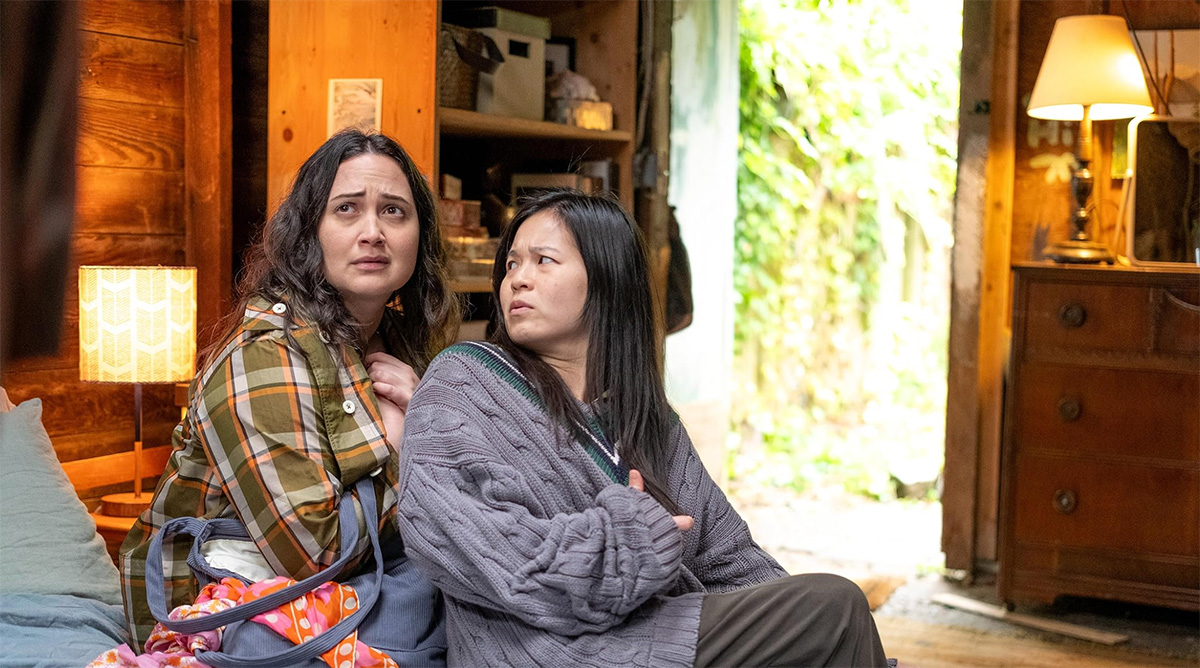
Creating a worthy remake can be a tricky proposition, especially when the movie being remade is a beloved classic – but that doesn’t mean it’s an impossible one.
Consider Andrew Ahn’s new version of 1993’s “The Wedding Banquet,” a film that put future “Brokeback Mountain” director Ang Lee on the proverbial map in America, which opens in theaters this weekend after a debut at Sundance earlier this year. The original, an American/Taiwanese production which became a surprise hit in the U.S., broke ground with its story — a culture-clash comedy of manners about a queer romantic triangle attempting to stage a sham wedding, it was quickly embraced by LGBTQ audiences thrilled to see representation on the big screen and positive representation, at that, in an era when it was even scarcer than it is today. To undertake a remake of such a film is a bold move, to say the least.
Yet gay Korean American writer/director Ahn (“Spa Night,” “Fire Island”) – has built his blossoming career on films about queer relationships among Asian American characters, with as much (or more) emphasis on family, both biological and chosen, as on romantic partnership; It seems natural, perhaps, for him to reinterpret this influential classic through his own lens, and he’s already proven himself as a filmmaker whose strengths line up perfectly with the material.
Even so, Ahn hedges his bets, perhaps, by collaborating on the new screenplay with James Schamus, who also co-wrote the original (along with Lee and Neil Peng), and the result is a movie that – although it recrafts the original romcom for a newer age and reconfigures its central relationships a bit to “up the ante” on its complications – stays relatively faithful to the broad strokes of its plot.
In this iteration, the New York setting is transposed to Seattle, and the plot revolves around not just one queer romance, but two: Chris and Min (Bowen Yang and Han Gi-Chan), a stalled grad student and his South Korean boyfriend, and their lesbian friends-and-landladies Lee and Angela (Lily Gladstone and Kelly Marie Tran), who are struggling to become parents through expensive IVF treatments. Min, an artist whose temporary visa is about to expire, wants to stay with Chris and build a life in America, but his grandmother (Youn Yuh-jung) – currently running the vast family business empire to which he is heir – wants him to come home and claim his place in the organization. A wedding to Chris would secure him the green card he needs to defy his grandmother’s demands, but it would also mean outing himself as gay and potentially being cut off from his inheritance. As a solution, he offers to pay for Lee and Angela’s fertilization procedure in exchange for a “green card wedding” with the latter, ensuring that he can remain in the U.S. while also remaining in the closet to his family.
Of course it’s an idea as bad as it sounds, but despite some reticence, the couples agree to the plan; but when grandmother decides to come to America and meet the bride in person, the four of them must attempt to pull off a masquerade that escalates far beyond their expectations after she insists on putting on a traditional – and elaborate – Korean wedding worthy of her grandson’s exalted status, all while wrestling with the ambivalence and doubts that begin to encroach on their relationships as the scheme begins to fray at the edges.
Those who’ve seen the original already know that things don’t play out exactly as planned – and anyone who hasn’t won’t be surprised when it doesn’t, anyway. We already told you it was a bad idea.
That, of course, is the charm of the romcom, a genre in which mishaps, crossed wires and conflicts are all part of the fun, and in any case it gives Ahn’s film the opportunity to explore – as Lee did with the original – the more serious and relatable challenges of reconciling our queerness with the deeply ingrained traditions of our cultural background; he does so with gentle wit and an equal measure of respect, but he’s not above getting laughs by pointing up the sheer absurdity that sometimes goes along with the process. Neither does he hesitate to delve into the messiness of queer relationships, even (and perhaps especially) with lifelong friends, or the deep insecurities and self-criticisms which get in the way of sorting them out.
To these ends, “Wedding Banquet” relies heavily on its cast, who embrace and clearly relish the chance to flesh out these characters. Yang brings his inevitable “SNL” star power to the table but downplays the wackiness in favor of a more nuanced tone, and Gi-Chan shines as his pragmatically idealistic partner; Gladstone’s intelligence and authenticity is a grounding force, while Tran counterpoints her with an eminently likable turn as her spunky-but-anxious misfit of a girlfriend – and the resonance they each bring to the prospect of motherhood highlights the longing for family and legacy that so many queer couples carry as they build their lives together.
It’s not all about the couples, though. Veteran Chinese American actress Joan Chen (“Tai Pan,” “Twin Peaks”) is a scene stealer as Angela’s hyper-supportive mom, whose participation in her daughter’s “lavender wedding” requires her to go against her deepest instincts as a proud ally, and Bobo Le provides a further connection to the theme of family with a charming performance as Yang’s tomboy-ish little sister. The anchoring performance, however, comes from acclaimed Korean star Yuh-jong, whose shrewd, savvy, and staunch portrayal of Gi-Chan’s power player grandma adds a much-needed dose of level-headed wisdom into the midst of the whirlwind.
In the end, Ahn’s update of Lee’s classic comedy scores big points for honoring the original’s message of acceptance and embracing the notion of reimagining our ideas of traditional family structures to meet the needs of an ever-changing world; it also succeeds in maintaining a heartfelt sense of empathy for each of its characters, all of whom appeal to us precisely because of their imperfections and their hangups. None of them are perfect, but all of them are perfectly human, which goes a long way toward making Ahn’s remake feel like more than just the slickly-made feel-good romcom it resembles.
And yet, given the screwball potential and the endless possibilities for farcical developments in the convoluted deception attempted by its sets of lovers, Ahn’s “Wedding Banquet” could have been funnier. Leaning into an idealized and sentimental perspective as it gracefully brings its characters’ lives into place, it occasionally feels a bit “precious,” too “Hollywood” to be believed.
Again, however, this is part of the charm of the romcom: if generations of straight audiences have gotten the chance to buy into idealized big screen fantasies about life and love, then why shouldn’t we enjoy the same privilege?
With that in mind, “The Wedding Banquet” makes for a perfect opportunity to entertain and validate ourselves – and even if it doesn’t tickle your funny bone, it’s a generous enough feast for your queer soul that it deserves you to see it.
Just make sure you bring somebody special to share your popcorn with.
-

 El Salvador4 days ago
El Salvador4 days agoGay Venezuelan makeup artist remains in El Salvador mega prison
-

 State Department3 days ago
State Department3 days agoHIV/AIDS activists protest at State Department, demand full PEPFAR funding restoration
-

 Maryland5 days ago
Maryland5 days agoMd. schools plan to comply with federal DEI demands
-

 Brazil3 days ago
Brazil3 days agoUS lists transgender Brazilian congresswoman’s gender as ‘male’ on visa

